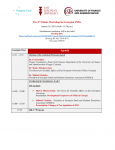The "3rd Online Workshop for Georgian SMEs" on January 29, 2024, is a significant event emphasizing the vital role of SMEs in Georgia's economy. SMEs are key drivers of economic diversification, innovation, and job creation. This workshop offers a platform to discuss the latest trends, challenges, and opportunities in the SME sector, providing valuable insights from experts. It's an essential forum for SME owners, entrepreneurs, and policymakers, facilitating an exchange of ideas and strategies to enhance the growth and competitiveness of Georgian SMEs in the global market.
This workshop provides an overview of the recent advancements and future outlook for Small and Medium-sized Enterprises (SMEs) in Georgia. It draws from a range of research studies and analyses conducted post-2020 to offer insights into the challenges, innovations, and growth trajectories of Georgian SMEs.
Current State of SMEs in Georgia: The influence of European funds, particularly the European Fund for South-Eastern Europe (EFSE) and the EU4Business Initiative, has been significant in bolstering the economic development of SMEs in Georgia. These initiatives have set a precedent in combining capital from public and private investors to mobilize more resources for sustainable development, significantly impacting the SME sector in Georgia (Panov & Kushchak, 2021).
During the COVID-19 pandemic, Georgian SMEs faced numerous challenges, including lockdowns and decreased sales. However, they adapted by enhancing digital capabilities and shifting to online channels. This shift not only helped them survive the challenging period but also paved the way for new methods of business operation (Maglakelidze & Erkomaishvili, 2021).
Furthermore, Fintech has emerged as a significant opportunity for the development of the SME sector in Georgia. The advent of modern digital financial technologies is seen as a paradigm-changing instrument, although it faces challenges like legislative support and market competition (Charaia & Lashkhi, 2021).
Regional Development and Policy Impacts: SMEs contribute significantly to regional economic development, as seen in Adjara A.R., where government policies have fostered a conducive SME environment. This contribution is evident in the positive impacts of the number of employees and their productivity on gross value added, highlighting the significant role of SMEs in regional economic growth (Glonti, Manvelidze, & Surmanidze, 2021).
The introduction of a new law on microbanks in Georgia is expected to transform the financial market. This law will likely increase the competitiveness and diversification of financial services available to SMEs, thereby enhancing their growth potential and market presence (Dzadzua, 2022).
Pandemic and Adaptation: The pandemic led to the rapid adaptation of SMEs, emphasizing the need for state support and a shift towards innovative and digital platforms. This adaptation was crucial in mitigating the impact of the pandemic on SMEs, highlighting the resilience and agility of these enterprises in times of crisis [(Gechbaia et al., 2021)](https://consensus.app/papers/problems-caused-impact-covid
The resilience of Georgian SMEs is evident in their response to the COVID-19 pandemic. They have demonstrated adaptability by increasing their innovative capabilities and moving towards digital platforms. The lockdown, despite being a major challenge, acted as a catalyst for change in entrepreneurial behavior, promoting more favorable business activities through digital channels. This shift has significant implications for the future of SMEs in Georgia, indicating a trend towards digitalization and innovation-driven growth. The government's role in supporting these transitions, particularly through tax incentives, subsidies, and educational initiatives in entrepreneurship and technology, is crucial for the sustained development of SMEs (Maglakelidze & Erkomaishvili, 2021).
In addition, the introduction of fintech and the new law on microbanks are poised to revolutionize the financial landscape for SMEs in Georgia. These developments will likely enhance the availability of financial resources, encourage competition, and lead to more diversified financial services for SMEs. Such changes are expected to foster a more robust economic environment conducive to the growth and scalability of SMEs (Dzadzua, 2022).
The tourism sector, significantly impacted by the pandemic, underscores the need for sustainable practices in SME operations. This sector's experience during the pandemic highlights the importance of adaptability and the need for strategies that can withstand such global crises (Bērziņa & Tsoy, 2021).
The environment for SMEs in Georgia is changing quickly, with both opportunities and challenges. The pandemic has acted as a catalyst for change, pushing SMEs towards digitalization and innovation. The government's role in fostering a supportive environment through policies and financial mechanisms is pivotal. The future for Georgian SMEs appears promising, with trends indicating a move towards a more digital and innovative business environment. This progression positions Georgian SMEs well for sustainable growth and resilience in the face of future challenges.


